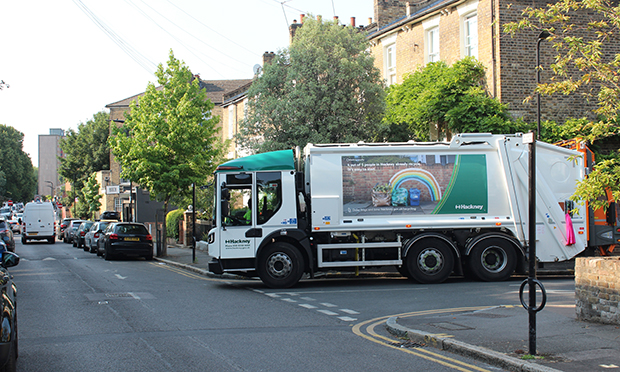Hackney Council unlikely to hit target of switching to electric vehicles by 2030, officers admit

Moving to electric waste trucks would be ‘very costly’ and only deliver ‘limited’ cuts to emissions, said council’s fleet manager. Photograph: Hackney Council
Hackney Council is unlikely to meet its goal of switching to a fully-electric vehicle fleet by 2030, Town Hall officers have said.
At a meeting of the cabinet insourcing and procurement committee on Monday, corporate fleet manager Norman Harding revealed the Town Hall needed a more “realistic” transition date.
Harding had raised the urgent need to replace nearly 50 per cent of its refuse trucks with similar vehicles using internal combustion engines, which the committee approved.
But Cllr Alastair Binnie-Lubbock (Green) quizzed Harding over whether this would affect the council’s commitment to electrify all its vehicles by the turn of the decade.
The fleet manager confirmed this was the case.
“Further work needs to be done to try and establish a more realistic date to transitioning to full electric technology for the full fleet,” Harding said.
In 2023, Hackney’s former climate, environment and transport chief Mete Coban brought forward the deadline for the council’s transport and buildings to achieve net-zero emissions by 10 years, from 2040 to 2030.
Harding recalled at the meeting how he had told the ex-cabinet member that meeting this ambition would be a real challenge.
“I had spent considerable time with [Coban] demonstrating the difficulties of trying to transition from our existing and hugely successful use of renewable biofuels, to moving to electric vehicle technology,” he said.
Coban left the council earlier this year to become London’s deputy mayor for environment and energy.
Harding told members that switching heavy goods vehicles (HGVs), like those used for waste collection, to electric models would be very costly, only deliver limited cuts to carbon emissions, and “instill an element of fragility into our operations”.
It was also revealed that the “urgent” need to replace waste collection vehicles had emerged from the “failed experiment” of delaying spending on the trucks.
To avoid capital expenditure, the council had attempted to operate the vehicles for three years longer than they are expected to run for.
“The vehicles are now in the ninth year of operation, and we are experiencing high levels of downtime and high maintenance costs, in a nutshell,” Harding said.
Hackney Greens co-leader Cllr Binnie-Lubbock had earlier raised a paper from the UK government, promoting the transition from internal combustion engine vehicels to battery-powered ones.
But Harding dismissed the report as “misleading” and pointed to the council’s success in cutting truck emissions by up to 92 per cent by using hydrotreated vegetable oil (HVO) as fuel.
Before it was given the green light by councillors, Binnie-Lubbock asked officers whether they had conducted a full cost-benefit analysis on putting infrastructure in place to charge electric trucks.
Harding replied that the council’s already limited depot space for vehicles made it impossible to install chargers, which in turn made it a “very difficult thing to actually cost”.
Chris Pritchard, director of strategic property and finance, tried to assure members there was no dampening of enthusiasm from officers to meet the net-zero goals.
“We do understand that the target is 100 per cent electrification. What we’re trying to do with this work is to keep as informed as an organisation as we can, get there as fast as possible but also keep track of the developments in competing technologies.
“The data on this is not brilliant yet. We still don’t know what the overall impact of battery-powered vehicles will be on the planet.
“We certainly know they emit no emissions when we use them in Hackney, so it’s great for our local residents.
“We haven’t taken our eye off the prize in terms of electrification but will keep members up to date with other developments that appear alongside.”
Despite the affect that buying new trucks would have on climate goals, fleet manager Harding was bullish about the council’s progress.
“If all the council’s owned vehicles were to become powered by HVO, “the full fleet would save 3,500 tons of CO2 and we could promote the fact that we would be entirely fossil-fuel free”.
